Ultimate Guide on Seven Card Stud Poker rules and gameplay
Back in the day seven card stud poker was the most popular variation of the game. It was widely played in US-based casinos before the early 2000s when Hold’em took over, and it is still played today.
However, There are occasions when we here at ReadyBetGo want to bring you interesting facts about the gambling industry When something catches our eye, we will publish it for your enjoyment.
There are occasions when we here at ReadyBetGo want to bring you interesting facts about the gambling industry When something catches our eye, we will publish it for your enjoyment. 
Binion's poker room it’s a very different game from popular versions nowadays, like Texas Hold’em or Omaha Hi-Lo, which is why our team is here to help. We’ll discuss the basic 7-card stud rules, gameplay, and hand rankings to redeem its glory and help you understand how it works better so you can apply it in a real game.
Gameplay and Basic Rules of 7 Card Stud
The main difference between the poker 7-card stud and Hold’em is in the base gameplay, pre-betting rounds, and hole cards. The game can be played with 2 to 8 players, but it usually works best with a full table and 8 participants.
The dealing rounds are also different since, unlike in Hold’em and Omaha, no community cards are visible on the table. A unique scenario may be where a single community card gets drawn, but we’ll talk about that later.
You should be aware that the main difference between seven-card stud rules and currently popular games like Omaha or Texas Hold’em is the absence of community cards, flop, and more dealing rounds.
Betting Dynamics and Dealer Rules
The dealing and betting rounds in seven stud poker are pretty different from what you may be used to as a Hold’em player, so let us walk you through it. The stakes in this game will usually be identified with two numbers. To make things simpler for the sake of this guide, let’s say you want to play in a $10/$20 round of 7-card stud poker.
If that makes you wonder how to play seven-card stud, we realize it’s pretty unique, and the thing is - the first number identifies the first bet, while the latter one identifies the second bet. The first bet is the value used for betting rounds until the fifth card (the fifth street).
At that point, the betting limit moves to the second number, so you’d have to bet and call with $20 for the final two betting rounds. Now that we’ve explained let’s discuss the dealing and betting rounds. It all starts with players receiving two cards, each facing down.
These are your hole cards; to receive them, you have to place an ante that’s usually up to 20% of the “first bet value” or, in our case, the $10 mark. So, you’d have to place a bet of at least $2 to start the game, and that’s where the dealing rounds start. It’s also vital to state that this game is usually a “Limited” poker version, unlike Hold’em, which is usually a “No Limit” game, so you have fixed betting and raising values specified by the two betting marks ($10 and $20 in our case).
Dealing in Seven Card Stud Poker
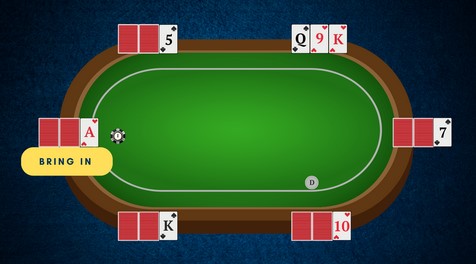
After placing an ante, players in a game of a 7-card stud poker receive two facedown cards (hole cards) and one face-up card (door card). This is the first dealing turn, and if you aren’t playing in a casino, there’s a chance of using a dealer button to determine the dealer as the dealing is then done clockwise to the left.
Each new round comes with the button moving to the left, ensuring the game follows this pattern in order. Regularly, you’ll have to place an ante bet before each betting round, leading us to the next wager you must place - the “bring in.”
This one is determined by that door card we mentioned since a player with the lowest card or suit (in alphabetical order) has to place a bring-in equal to around 50% of the small bet value (about $5 in our case since the small bet is $10), and that leads us to the first betting round.
Third Street and Fourth Street
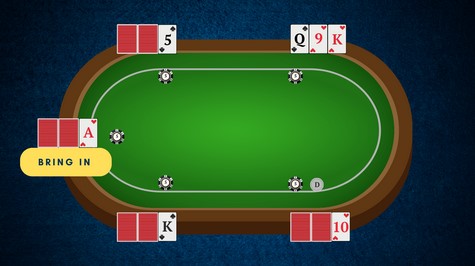
Once the bring-in player has been determined, a player to his/her left starts the first betting round of the seven-card stud poker. As we mentioned, in a $10/$20 game, bets will be up to $10 during the third and fourth street. Players that placed their bets have the following options:
- Call - This is your first option. The 7-card stud poker rule says that you can call after a player has already placed a bet by increasing your bet amount to that of a bring-in bet, keeping in mind that it’s the highest bet on the table until there has been a raise.
- Raise - The rules of 7-card stud allow for 4 raises during a single betting round. So, the first one starts as a player follows the call bet and adds a matching amount to the bet. If a player raises before your turn comes, you have to follow and call his bet; otherwise, you have to fold and give up on your bet. Please note that there could be “re-raises” even in a single round, all happening in equal increments. In our case of a $10 small bet, a raise would lead to $10 added and another $10 for a re-raise.
- Fold - If you can’t raise and follow up on the previous player’s bet, you can fold and give up at this game stage. However, you mustn’t reveal your hole cards as they have to remain hidden for the game’s integrity, as other players would be impacted by seeing your cards (since it’s a game with 8 players and a single deck of 52 cards).
- Go all-in - You can go all-in at this point if you wish to do so, and that would reward you with chip values equal to your bet taken from every other player.
Once the first betting round has been finished and the bring-in player has matched the small bet by wagering chips equal to the difference between the bet and the bring-in, the game proceeds with the next round - the “fourth street”.
Once again, players get the second door card at this point, so it’s the second card you’ll have facing up and two cards facing down. These two cards will affect the course of the betting round since a player with the highest two-card hand follows through with an initial bet.
There’s an ability to check at this phase, which happens if nobody else has placed a bet in the pot at this point, but if they did, you have no option other than to bet or give up and fold.
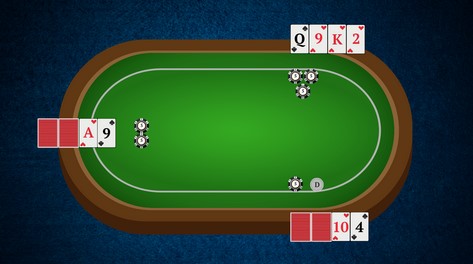
From 5th Street to the Showdown
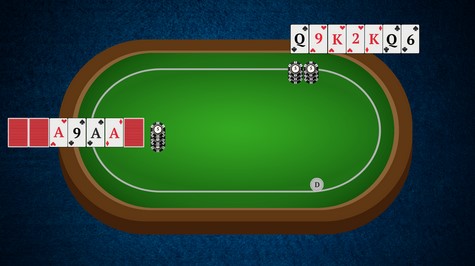
The Fifth Street is where things get more interesting since you’d have to follow through with the “higher” bet from here on out. If you remember, we gave an example of a $10/$20 game, which means that from this point on, you have to follow with a $20 bet in each round.
The Fifth Street isn’t different from the previous round except that you’d have a third-door card at this point. So, with two face-down cards and three cards facing up, you’d get an initial picture of your five-card hand. Since there are no community cards in this game, you may raise or call depending on your initial impression of the five-card hand.
Also, door cards are used to determine the player who starts the betting round, once again with the player that has the highest three-card hand. Once again, you can call and raise and re-raise or fold at this stage.
This pattern follows through with the sixth street, so you would have four face-up cards. The same mechanics determine the player who starts the betting round, while the seventh card is again dealt face-down. This stage is called the 7th Street, and the betting sequence is the same as for the Sixth Street, considering there were no changes in the values of the door cards.
The 7th Street leads to a “showdown”, which is when you’d have the following options - bet or fold. If all the players except for you fold, you are automatically the winner regardless of your hand’s value. However, if at least two players are active at this phase, all players reveal their face-down cards and show their strongest five-card hand.
Hand rankings are the same as in Hold’em, with the suit ranks going in alphabetical order. If two players have the same hand at this stage, they split the pot. In case there are no cards left at this stage, some seven-card stud variations allow for a single community card to be placed.
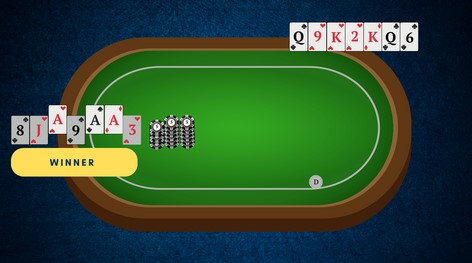
Best Starting Hands in 7-Card Stud Poker
Now that you know the basics, it’s time we get to the best poker hands you can have from your initial two-hole cards and a single-door card. Here’s a list with the poker hands ranked out of the three cards going in ascending order from strongest to weakest:
- Three aces
- Three-of-a-kinds
- Two hidden aces
- Two hidden jacks or kings
- Three “big suits”
- Any pairs
- Two big suits and a connector
One thing to have in mind here is that the chance of being dealt triple aces is close to zero here since it’s an active game with up to 8 players. However, the two-hole cards can dictate the power rankings as they allow for some calculations, or at least more than the game of Hold’em does, according to poker tips we’ll lay down later on.
Because of this, you may wonder how to play stud poker? Well, knowing the starting hands is your best starting option since, for instance, it’s not the same for your hand if you land two facedown aces or one facedown and one as your door card. The first scenario means only you will know that you have double aces, while the latter means others can assume you have at least one or two down the road.
So, the first scenario combined with the situation where no other player has visible aces increases your chance of getting triple aces down the road with each new dealing round.
Knowing the best starting poker hands for a round of 7-card stud is only the first step since the longer the cards you need for good poker hands are live, the more combinations you’ll have in play. The fact you can see other players’ cards therefore keeps these combinations alive.
Poker Hands Ranked
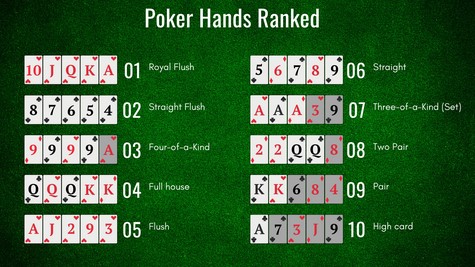
Knowing each stud poker rule may help you understand the course of the game better, but you also need to know the hand rankings. So, here’s a full list of best poker hands for a 7 stud round (note that the rankings are the same as for other high poker games):
- Royal flush - A, K, Q, J, 10 of the same suit
- Straight flush - five cards ranked in straight sequence from high to low of the same suit (10, 9, 8, 7, 6 of the same suit)
- Four-of-a-kind - four cards of the same rank with a different suit
- Full house - three cards of the same rank followed by two pairs coming right below them in rank
- Flush - a regular flush contains five cards of the same suit that don’t have to be in a straight order
- Straight - five cards in a straight sequence with a different suit
- Three-of-a-kind - like four-of-a-kind, only this time with three cards of the same rank
- Double pairs - two pairs
- Pair - a single pair
- High card - five cards that don’t have to be in straight order or of the same suit but follow through from high to low
All these poker hands ranked from highest ranking to lowest reflect the 7-card stud game just as they do with Omaha or Hold’em. The only difference is - this time your hands in poker won’t consist of community cards, but you’ll have the edge knowing the rankings thanks to revealed opponent cards.
Tips How to Play Seven Card Stud
If you are still wondering how to play stud poker, we’ll give you a few pointers. First, make sure you are playing a “regular version” of the seven-card stud since different poker tips may be valid for a different version. So, here’s a list of the most useful in-game tips:
- Play a version of the game you are familiar with
- Learn the hand rankings
- Keep in mind the door cards of other players
- Fold if you have a bad hand and the cards you need are already out
- Play a game with a reasonable small bet/big bet limit
We’ve laid out the foundation for playing the regular limited version with rules for 7-card stud poker, but that may not be the one your local casino offers. Also, be aware of your opponents’ cards since, this time, you can gain an edge by combining the hand rankings and counting in your two-hole cards, along with seeing the door cards of your opponents.
This may give you an upper hand as it allows for some calculations, mostly regarding the cards you need, which are still live. If you need cards that are out, at least it gets easier to fold in case of a bad hand. The same goes for bluffing - you may be able to win in case everyone else folds, but it’s sometimes better to fold yourself in case you have a bad hand, and the cards you need are out.
Other seven-card stud tips include playing with a comfortable bankroll (choosing a lower limit table) and raising in specific situations to try and make others fold.
Where Can I Play 7 Card Stud Poker?
Now that you know the rules of seven-card stud poker, the next thing you’d want to know is probably where to play it. Well, it’s perhaps sad news that this game is a lot rarer than variants like Hold’em or Omaha.
Most online casinos, such as 20Bet, Casinozer, or Stupid Casino, usually focus on the more popular types of poker. However, you can also visit sites such as PokerStars or Ignition Casino, where you can find a more diverse poker offer.
Since you can’t assume that the same rules for stud poker apply to different versions, we recommend you start with free seven-card stud poker. That would enable you to learn the basics in-game and gain first-hand experience before joining a real money table to play with experienced players.
Platforms like AoI Games provide players with a plethora of poker options that can be played for demo credits. In other words, you get to play free 7-card stud poker and learn the basics while getting all the precious experience with a risk-free approach.
Finally, you can always play it at home if you can’t find or afford to play seven-card stud online since it’s a game you can play in demo chips with your family and friends.
Seven-Card Stud Poker Variations
One last thing we need to discuss is the availability of different seven-card stud variations. The rules of stud poker are more or less the same, but there are some slight differences based on different poker games.
The regular version of the game is often referred to as Down the River or Seven Toes Pete, and these are the subsequent options:
- High Low
- Baseball
- Low Card Wild
- Pass The Trash
- No Peek
All these poker variations have slightly different rules, even though most of the regular ones we’ve explained still apply. Along with the “Down the River” game, the most basic rules can be found in the High Low stud game.
This time, the difference is in pot-splitting mechanics since low-hand and high-hand players get to share the pot. However, a low-hand player has to have a maximum card value of 8 at most. The Baseball version has 3s and 9s that can be used as wild, just like the lowest hole card can in the game of Low Card Wild.
The Pass the Trash is unique for having all seven cards dealt face-down to players, and you get to decide the order in which you reveal the door cards. Finally, the No Peek version includes similar face-down mechanics, only this time, a player to the dealer’s left starts unveiling door cards with his first while the game proceeds as long as players can beat the next player with their face-up cards.
